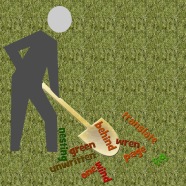Music, when soft voices die, vibrates in the memory.
~Percy Bysse Shelley
She will end like the fading
of music,
a lovely note drawn to its
silent conclusion when
her song, having reached
crescendo, dies. Soft
lilting, beautiful in its sad
demise, she joins voices
of angelic choirs, all
endearing songs that would die.
Every sound resonates and vibrates
filling the air with the
cacophony of death’s knell. In
the evening when all is
silent and still, she sings the
song of her beauty to live in
my memory.
©CE-2016
From "Quickly's Winter Doldrums" - Jan. 30, 2016:
 January
30
January
30
The Borrowing Poet
In his poem “The Golden Shovel” Terrance Hayes takes “We Real
Cool” by Gwendolyn Brooks and repeats it twice. Each word of the
original becomes an end word in the poet’s new poem.
Read down the right margin of “Golden Shovel,” and you get “We Real Cool.”
“We Real Cool” by Gwendolyn Brooks
“The Golden Shovel” by Terrance Hayes
I want you to do something similar.
Choose a poem that you like or admire. (You’ll have noted that the
Brooks poem is relatively short. You can use a line, a couple of lines, a
stanza, an entire poem.)
Remember that your poem doesn’t have to be (probably shouldn’t be) about the same subject as the source poem.
OPTIONS:
1) Use your chosen section as Terrance Hayes did, to create your own Golden Shovel.
word word word word word the
word word word word fog
word word word word word comes
word word word word word on
word word word word word word little
word word word word word cat
word word word word word word word feet
2) Easier, but not as cool–let your selection read down the left margin. Begin your lines with its words.
the word word word word word
fog word word word word word
comes word word word word word
on word word word word word
etc
3) Forget the shovel, and use your chosen section as your poem’s title, first line, or epigraph
Whatever you do, give us the names of the poet and poem, and a link to the original piece.



